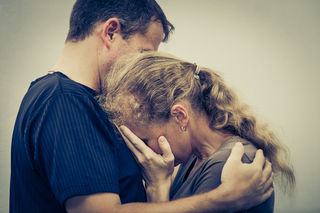Miscarriage
The 3 Most Destructive Myths about Miscarriage
The truth can help you heal.
Posted July 16, 2019

The death of a child can be devastating, regardless of their age. What many do not understand, however, is that losing a child before birth can be equally devastating.
After a miscarriage, it is important to allow yourself to mourn. However, there are others who will let you know that they do not believe there is any reason to grieve. As some will say, "You didn’t even know the child.”
What is not understood is that in many cases, a bond begins to form the minute a woman finds out she is pregnant. There is usually much joy and celebration with the news of pregnancy—but when there is a miscarriage, others do not seem to understand your need to grieve.
Indeed, new research[1] finds that in one sample, 75 percent of women who had had miscarriages did not feel supported in their grief. Experiencing grief when others do not recognize or support it is referred to as "disenfranchised grief."[2]
This helps to explain why, on finding out about a miscarriage, others often say, "Why are you upset?” or, if you have children, they may say “At least you have the other children.” Finally, frequently said is, “You can always have other children.” While that may be true, at the time you are not thinking about another child—you want the one you were carrying.
As with most myths, not having the facts can create even more problems for someone mourning a miscarriage.
Myth #1: Miscarriage can occur if you exercise too much, have sex, pick up your toddler, etc.
This happens to be the most damaging myth of all. Women immediately assume that it was something about them or something they did that caused the miscarriage.
The truth is that about 70 percent of miscarriages are caused by chromosomal defects.[3]
Many women who have had a miscarriage go on to have healthy babies. Regardless, miscarriages can have a profound psychological effect. In addition to guilt, women often feel lost, cheated, and empty. They experience depression, anxiety, have lowered self esteem, and generally feel like a failure.
It is important at this time for women to stop beating themselves up over something they could not control. Healing cannot take place as long as you are harsh with yourself.
Myth #2: Women experience less grief if they miscarry early in the pregnancy.
Although this may be a common belief, research has been unable to find an association between grief and length of pregnancy. In some ways, grieving after an early loss may be more difficult because it is invisible to others. With later miscarriages, there may be a funeral or some other special acknowledgment of the death. As a result, there may be more outward support.
Regardless of the age of the fetus, women can feel great anguish when a miscarriage occurs. There are many variables that might contribute to this. For example, if a couple have been trying for a long time to get pregnant, and then lose the baby in the early stages of the pregnancy, it can be devastating.
Myth #3: Miscarriages do not affect men.
Most people view miscarriage as something that impacts the mother and not the father. It is common for people to ask how the mother is doing and not ask about the father. A report in Psychosomatic Medicine found that many women feel like a mother as soon as they find out they are pregnant. Men, on the other hand, may not feel like a father until they can see and hold the child.[4]
Men’s grief can become invisible and they get even less support than women. It has been well established that there is a difference in the ways that many couples grieve. Both partners can experience intense grief but express it in different ways.
Women are generally more outwardly emotional than men, who tend to keep themselves busy doing necessary tasks.[5] This difference can also lead to issues between the couple in which one partner feels the other is grieving too much—while the other feels they are not grieving enough.
If support is not forthcoming from family and friends, it is important to reach out to someone with whom you can share your feelings. That may be a therapist, a spiritual advisor, or a support group. If those things are not an option for you, then consider writing about your experience.
It is important as a couple to support each other and to share your thoughts and feelings. Both partners should also ask for what they need from the other. If possible, take some time off to adjust and heal the physical and emotional changes you may be experiencing.
If working, speak with your supervisor and human resource representative about taking some time off. Fortunately, there are many resources for anyone who has suffered a miscarriage. For local support groups or a therapist, contact your Ob/Gyn to find one near you, or look in the Psychology Today therapy directory.
References
2) Doka, K.J. (1989). Disenfranchised Grief:Recognizing Hidden Sorrow. Lexington, MA, England:Lexington Books/D.C. Health and Company.
5) Doka, K.J. and Martin, T.L. (2011). Grieving Beyond Gender: Understanding the Ways Men and Women Mourn, Revised Edition. New York, New York: Routledge.




